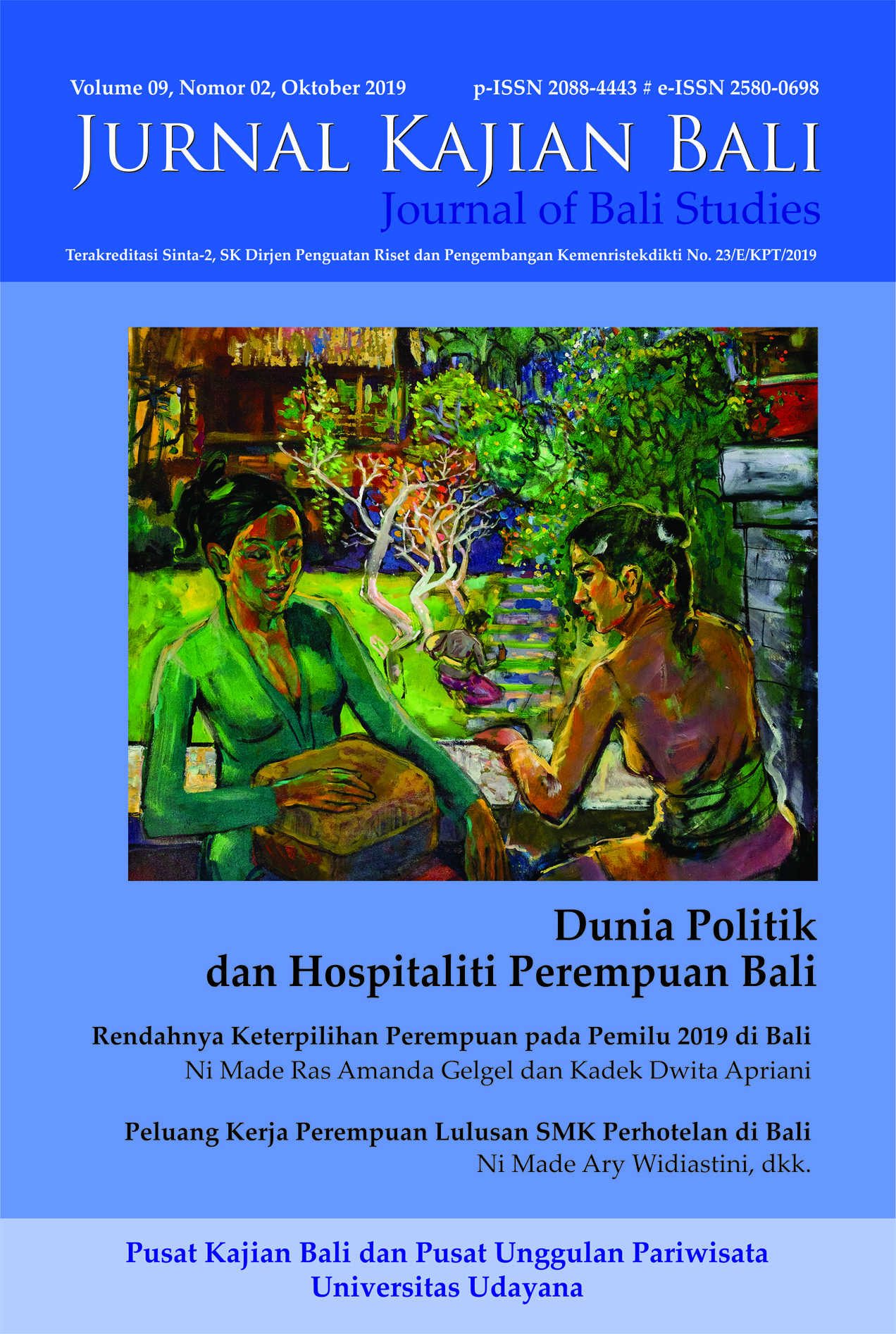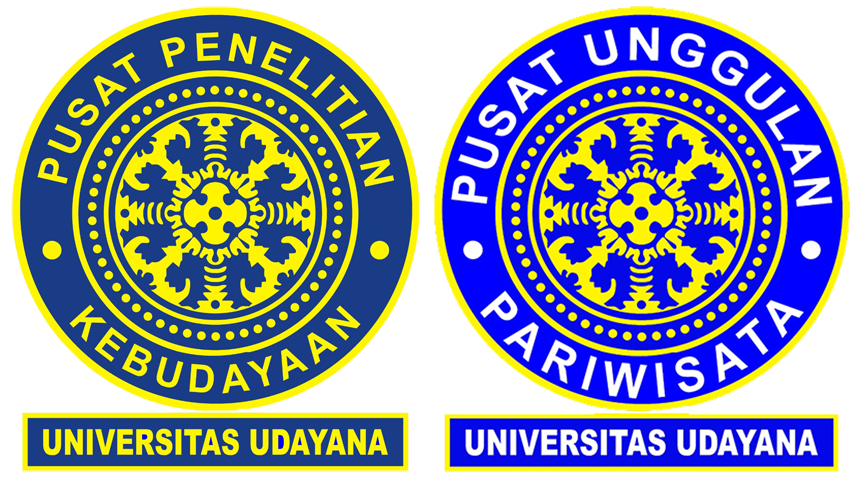Wacana KB Krama Bali : Analisis Persepsi Warganet di Media Sosial Facebook
Abstract
This study aims to determine the netizen perceptions related to Balinese family planning (KB Krama Bali) discourse on Facebook. Unlike general principle of family planning in Indonesia which limit family to have two children, in Bali the allowing number is four. To achieve the study objective, the method used is qualitative. The study show that: 1) There are variations in the coverage of the KB Krama Bali discourse on Facebook by several online media, seen from the title and intensity of the news. The variety of news coverage is inseparable from the internal policies and external influences of the media; 2) Most of the attitude of netizens towards the KB Krama Bali discourse is agree (47%). This shows that some of the netizens were enthusiastic about the existence of the KB Krama Bali, indicating that Balinese cultural values ??have a more important role than other values ??related to child ownership; 3) Netizens expectations of the KB Krama Bali discourse vary, but only 3 things stand out, namely no further expectations, incentives, and priorities in other programs. From this expectation, it is identified that economic and cultural values ??have a vital role in children's values.
Keywords: KB krama Bali, perception, social media, facebook
Downloads
References
Becker, G; K.M. Murphy and R.F.Tamura. 1993. Human Capital, Fertility,and Economic Growth, in Becker,G (ed), Human Capital: Theoretical and Empirical Analysis, With a Special References to Education. 3rd ed..Chicago,IL: Chicago University Press
Handayani, Lestari; Suharmiati; Iswari Hariastuti; Choirum Latifah, 2012. Peningkatan Informasi Tentang KB: Hak Kesehatan Reproduksi Yang Perlu Diperhatikan Oleh Program Pelayanan Keluarga Berencana. Buletin Penelitian Sistem Kesehatan. Vol. 15 No. 3 Juli 2012, pp. 289–297
Herman Kurniawan, Rasyika Nurul, Rahmat Hidayat. 2017. “Perilaku Akseptor Dalam Memilih Metode Kontrasepsi Jangka Panjang (MKJP) Di Poskesdes Anuta Singgani Kecamatan Mantikulore Kota Palu”, Jurnal Preventif, Volume 8 Nomor 1, April 2017, pp. 39-45
Hull,Terence H. 2010. Redefining Family Planning Through Decentralization (Tersedia Dalam Buku Keluarga Berencana dan Kesehatan Reproduksi, Halaman 73-95). Yogyakarta: Pustaka Pelajar dan PSKK UGM.
Instruksi Gubernur Bali Nomor 1545 Tahun 2019 Tentang Sosialisasi Program Keluarga Berencana (KB) Krama Bali.
Krisdinanto, Nanang. 2014. “Anomali dan Teori Hirarki Pengaruh terhadap Isi Media”, Komunikatif, Jurnal Ilmiah Komunikasi, Vol 3 Nomor 1, pp. 1-18
Manuaba, Ida Bagus Gde. 1998. Ilmu kebidanan, penyakit kandungan & keluarga berencana untuk pendidikan bidan. Egc.
McGurk, S. 2014. What is Social Media Engagament and Why it Matters for your Business. Tersedia pada http://blog.fusionfarm.com/what-is-social-media-engagement-and-why-it-matters-for-your-business. (diakses pada 3 Oktober 2019)
Pertiwi, Wahyunanda Kusuma. 2019. Facebook Jadi Medsos Paling Digemari di Indonesia. Tersedia pada www.tekno.kompas.com. (diakses pada 23 Agustus 2019)
Pradana, Yudha. 2017. “Peranan Media Sosial Dalam Pengembangan Melek Politik Mahasiswa”, Jurnal Civics, Volume 14, Nomor 2 Edisi Oktober 2017, pp. 139-14
Rahadi, Dedi Rianto. 2017. “Perilaku Pengguna Dan Informasi Hoax Di Media Sosial”, Jurnal Manajemen & Kewirausahaan, Vol 5 No 1. pp. 58-70
Ratnamulyani, Ike Atikah dan Beddy Iriawan Maksudi. 2018. Peran Media Sosial Dalam Peningkatan Partisipasi Pemilih Pemula Dikalangan Pelajar Di Kabupaten Bogor. Sosiohumaniora-Jurnal Ilmu-Ilmu Sosial dan Humaniora. Vol. 20, No. 2, Edisi Juli 2018, pp.154 – 161
Rimbawan, Nyoman Dayuh. 2018. Zaman Now: Masih Relevankah KB Bali? Artikel Koalisi Kependudukan. Denpasar: BKKBN
Rohim, Sabrur. 2016. “Argumen Program Keluarga Berencana (KB) Dalam Islam”, Jurnal Ilmu Syari’ah dan Hukum, Vol. 1 Nomor 2, pp. 47-70
Santoso Amanda P, Imam Baihaqi, dan Satria F.Persada. 2017. “Pengaruh Konten Post Instagram terhadap Online Engagement: Studi Kasus pada Lima MerekPakaian Wanita”, JURNAL SAINS DAN SENI ITS, Vol. 6, No. 1, pp. 50-54
Sarmita, I. Made. 2017. “Refleksi Kritis Kondisi Demografi Indonesia: Antara Bonus Dan Bencana Demografi”, Media Komunikasi Geografi, Volume 18 Nomor 1, Edisi Juni 2017, pp. 66-76
Sutinah. 2017. Partisipasi Laki-Laki Dalam Program Keluarga Berencana Di Era Masyarakat Postmodern. Jurnal Masyarakat, Kebudayaan dan Politik Vol. 30, No. 3, pp. 289-299
Watie, Errika Dwi Setya. 2011. “Komunikasi dan Media Sosial”, THE MESSENGER, Volume III, Nomor 1, Edisi Juli 2011, pp. 69-74.
UNDP. 2018. Human Development Indices and Indicators 2018 Statistical Update. New York: UN

This work is licensed under a Creative Commons Attribution 4.0 International License.



















